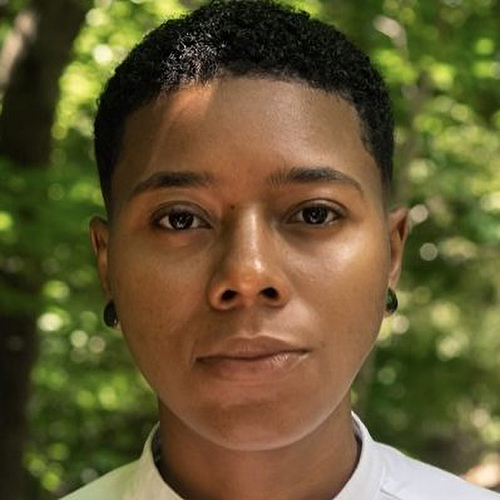
Dr. Briona Simone Jones is the Audre Lorde visiting professor of queer studies.
Before joining Spelman, Dr. Jones was an assistant professor in the University of Connecticut’s Department of English, focusing on women’s, gender, and sexuality studies. Prior to that, she spent six years at Michigan State University, where she completed her Ph.D. and held roles as a full-time instructor, University Distinguished Fellow, and inter-group race dialogues facilitator for the Office of Inclusion and Intercultural Initiatives.
Dr. Jones’s research and teaching span African American literature since 1895, Afro-Diaspora studies, queer theory, Black feminism, decolonial thought, gender and sexuality studies, comparative ethnic studies and Black studies. “The most innovative aspects of my research are my contributions to Black lesbian studies,” Dr. Jones said. “For the last 15 years, I have worked to understand and map the intellectual contributions of Black lesbians — whom I view as the architects of Black queer studies. Early in my career, I recognized the absences in literature syllabi and discourse as deliberate exclusions, not accidents. These absences were epistemic forms of violence, erasing knowledge production by Black lesbian writers and artists. To address this, I created my book, “Mouths of Rain: An Anthology of Black Lesbian Thought,” as a repository of Black lesbian history and thought across genres.”
Named in honor of Audre Lorde, a celebrated poet and advocate for civil rights and women’s rights, this professorship is affiliated with Spelman’s comparative women’s studies major and the Women’s Research and Resource Center (WRRC). The initiative was driven by a national advisory committee that included Spelman Board of Trustees member Colleen Taylor, C’90, New School President Dr. Dwight McBride, University of Chicago professor Dr. Cathy Cohen, writer and activist Gloria Steinem, founding director of the WRRC (1981) and Anna Julia Cooper Professor of Women’s Studies Dr. Beverly Guy-Sheftall, C’66, and Shenika Swan, J.D., MBA, the board operations director.
Dr. Evelynn Hammonds, C’76, Barbara Gutmann Rosenkrantz professor of the history of science and department chair and professor of African and African American studies at Harvard University, was appointed the inaugural Audre Lorde visiting professor of queer studies.
“Welcoming professor Jones to Spelman and working with her as she crafts an exciting year for our students has been the highlight of the Women's Center's busy year. Students are looking forward to taking her two courses next semester – a special topics course on Audre Lorde and a women's memoir course focusing on Black queer lives,” said Dr. Guy-Sheftall.
The Rochester, New York native was drawn to Spelman for its renowned WRRC and Archives. “Spelman’s program is innovative, radical, and one of the richest spaces to engage in revolutionary work,” she explained. “Being here allows me to work closely with students interested in Black queer and lesbian studies, joining the pioneering work of professors like Dr. Beverly Guy-Sheftall, Dr. M. Jacqui Alexander, Dr. M. Bahati Kuumba, and Dr. Evelynn Hammonds.”
Dr. Jones attributes much of her inspiration to her mother, Mary, whom she calls her “First artist, first teacher, and the person who introduced me to Black lesbian writer Audre Lorde.” She adds that other Black lesbians and feminists, such as Angelina Weld Grimké, Lucille Bogan, Barbara Smith, Cheryl Clarke, Alexis De Veaux, Dionne Brand and Mildred Thompson, have also profoundly influenced her life and work.
In January 2021, Spelman secured a matching grant for a $2 million gift from philanthropist Jon Stryker to establish the professorship. Stryker selected Lorde as the professorship's namesake to recognize her lifelong dedication to LGBTQ rights and progressive social change.
Lorde’s connection to Spelman includes multiple campus visits and her donation of personal papers to the Spelman Archives in 1995. The Audre Lorde Papers, part of the WRRC, have been accessible to scholars since 2009, thanks to a grant from the Arcus Foundation, established by Stryker, which enabled her materials to be processed and made globally available to students, faculty and researchers.
